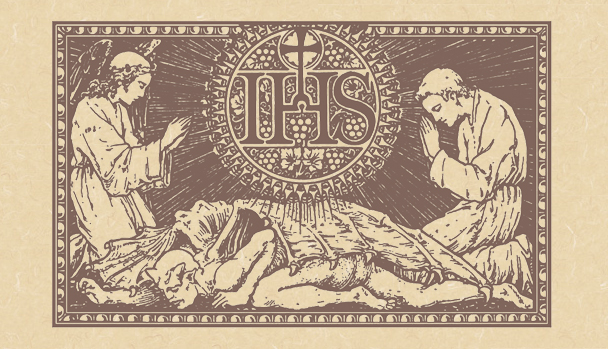When We Think Our Prayers Are Going Unanswered.
The Second Thursday of Lent; and, the Commemoration of Saint Frances of Rome, Religious.*
Lessons from the feria, according to the ordinary form of the Roman Rite:
• Esther C (14): 12, 14-16, 23-25.**
• Psalm 138: 1-3, 7-8.
• Matthew 7: 7-12.
The Second Thursday of Lent; and, the Commemoration of Saint Frances of Rome, Widow.*
Lessons from the feria, according to the extraordinary form of the Roman Rite:
• Ezechiel 18: 1-9.
• Psalm 16: 8, 2.
• Matthew 15: 21-28.
The Second Thursday of the Great Fast; the Feast of the Forty Holy Martyrs of Sebaste; and, the Feast of the Holy Martyr Urpasianus of Nicomedia.***
Lesson for the Sixth Hour with Holy Communion, according to the Ruthenian recension of the Byzantine Rite:†
• Isaiah 6: 1-12.
FatherVenditti.com
|
 8:03 AM 3/9/2017 — We all know that there are different kinds of prayer: the prayer of praise, the prayer of thanksgiving, the prayer of sorrow or contrition, the prayer of the presence of God; but, the first kind of prayer we learn as children is the one we all end up dong the most: the prayer of petition. It is a simple fact: most of the time, when we pray, we are asking for something. “Bless us, O Lord, and these, Thy gifts…”; we are asking for something. “Now I lay be down to sleep, I pray the Lord my soul to keep…”; we are asking for something. “Lord, have mercy…”; we are asking for something. When His disciples asked Him to teach them how to pray, He taught them a prayer of petition: “Give us this day our daily bread….” 8:03 AM 3/9/2017 — We all know that there are different kinds of prayer: the prayer of praise, the prayer of thanksgiving, the prayer of sorrow or contrition, the prayer of the presence of God; but, the first kind of prayer we learn as children is the one we all end up dong the most: the prayer of petition. It is a simple fact: most of the time, when we pray, we are asking for something. “Bless us, O Lord, and these, Thy gifts…”; we are asking for something. “Now I lay be down to sleep, I pray the Lord my soul to keep…”; we are asking for something. “Lord, have mercy…”; we are asking for something. When His disciples asked Him to teach them how to pray, He taught them a prayer of petition: “Give us this day our daily bread….”
The Scripture lessons for today's Mass are all about it. Queen Esther, in our first lesson, prays, “Lord, our King…befriend a lonely heart that can find help nowhere but in Thee” (Es. 14: 3 Knox); and, in the Holy Gospel, our Lord instructs us that the prayer of petition, when offered in sincerity of heart, will not be refused by God, with the understanding, of course, that God might have another plan for us.
Let's face it: we spend a good part of our lives asking for things from people who have more than we have. We ask because we are in need. Sometimes, with some people, asking for something is the only contact we have with them, which doesn't make for a very reciprocal relationship; and, whenever we find ourselves on the receiving end of this kind of relationship, we find it a bit trying. Our children are always asking us for things, but we expect it from children. With other adults, it can try our patience; and, how many of us have had to tell someone—or perhaps we never got up the nerve but wanted to tell them—that it's rather annoying to be in a relationship where one is always being asked to give but never to receive?
We may have experienced that kind of frustration many times, but somehow we don't make the logical connection to our relationship with God; so, our Lord makes the connection for us: “Which one of you would hand his son a stone when he asked for a loaf of bread, or a snake when he asked for a fish?” (Matthew 7: 9-10 NABRE).  It's a ridiculous comparison, of course, but our Lord is being ridiculous to make a point: we may get frustrated with people who are constantly asking us for something, always making demands on our time or our wallets or even just our emotional strength; but, God never gets tired of it. All the more reason for us to not forget that we owe a different kind of relationship to God. I think that may be the hidden meaning of our Lord's words at the end of today's lesson: “Do to others whatever you would have them do to you” (v. 12 NABRE). It's not just a repeat of the Golden Rule—well, actually, it is—but it's more than that. He's saying: “Just as you try to give your children whatever they ask, so God wants to give you whatever you ask; but, if you find that kind of one-sided relationship less than satisfying when you're the one being constantly asked, why do you presume to impose it on God?” It's a ridiculous comparison, of course, but our Lord is being ridiculous to make a point: we may get frustrated with people who are constantly asking us for something, always making demands on our time or our wallets or even just our emotional strength; but, God never gets tired of it. All the more reason for us to not forget that we owe a different kind of relationship to God. I think that may be the hidden meaning of our Lord's words at the end of today's lesson: “Do to others whatever you would have them do to you” (v. 12 NABRE). It's not just a repeat of the Golden Rule—well, actually, it is—but it's more than that. He's saying: “Just as you try to give your children whatever they ask, so God wants to give you whatever you ask; but, if you find that kind of one-sided relationship less than satisfying when you're the one being constantly asked, why do you presume to impose it on God?”
That's not to say—as I'm sure you understand—that God would ever become impatient with us the way we do when someone is always making demands on us; but, the soul seeking after perfection should want a different kind of relationship with God: one that not only asks, but rejoices in whatever is received, and gives in return. And while it's always risky to presume what's in the Mind of our Blessed Lord and try to read Him between the lines, it seems that Holy Mother Church agrees with me; otherwise, why throw Psalm 138 right in between these two lessons today? And those of you who frequent Mass in the extraordinary form should know today's Psalm by heart:
Confitebor tibi, Domine, in toto corde meo,
quoniam audisti verba oris mei.
In conspectu angelorum psallam tibi;
adorabo ad templum sanctum tuum,
et confitebor nomini tuo…
I will give thanks to you, O Lord, with all my heart,
for you have heard the words of my mouth;
in the presence of the angels I will sing your praise;
I will worship at your holy temple
and give thanks to your name (vs. 1-2 RM3).
Certainly a large part of our relationship with God is shaped by our petitions—what we ask Him for—but I tend to suspect that the real indicator of how close we are to Him is shown by what we thank Him for. In fact, I don't wonder if one of the reasons we sometimes feel that our prayers go unanswered is because our prayers of petition aren't accompanied by a spirit of gratitude for what we've already received. Perhaps a good item to add to our examination of conscience during this Holy Season is a little daily inventory of the ratio between what we ask of God and what we thank Him for. St. John Vianney said, “God has never denied, and never will deny, anything to those who ask for his graces in the right way” (Sermon on Prayer).

* Because Lent began on a Wednesday, today is the second Thursday. Cf. the post here under the heading "Hey, aren't you off by a week?" for an explanation of how the days of the liturgical calendar are rendered on this site as opposed to how they are designated in the Roman Missal.
A married woman, Frances of Rome (1384-1440) raised her three children in the love and fear of God, performing her household duties as though they were a Sacrament of Love. "A married woman," she said, "must often leave God at the altar to find Him in her household care." After her husband's death, she founded an order of oblate Benedictine nuns to serve the poorest of the poor. She is the patron saint of widows and—for some reason—motorists.
In the ordinary form during Lent, memorials automatically become commemorations, the observance of which is optional. If observed, only the Collect of the saint is used, with everything else taken from the feria, and the color of the season worn. In the extraordinary form, third class feasts also become commemorations, with the commemoration made by an additional Collect, Secret and Postcommunion added to those of the feria, and the color of the season is worn.
** This lesson is from the deuterocanonical portions of the Book of Esther found in the Greek text, but missing from the Hebrew text; they are included in all Catholic translations and regarded as canonical by all Catholic and Orthodox Churches. Modern Catholic Bibles include them where found in the Greek manuscripts; but, because both texts predate the chapter and verse numbering invented in early Middle Ages, they assign alternate identifications. The New American Bible Revised Edition designates this passage as coming from what it calls "Chapter C" which, along with "Chapter D," occurs between Chapters 4 and 5 according to the numbering assigned to the Hebrew text.
Saint Jerome, in the Vulgate, declared these passages the inspired Word of God, but included them at the end of the book out of place; thus, in older Catholic Bibles based on the Vulgate, including Knox, these verses are designated as coming from Chapter 14. Neither Chapter C nor Chapter 14 are found in any Protestant Bible.
*** Because the Great Fast began on a Monday, today is the second Thursday.
The Forty Holy Martyrs were put to death under Emperor Licinius in the year 322 or 323. Urpasianus of Nicomedia died under Emperor Maximian Gallerius (305-311).
† Cf. the second footnote to the post here for an explanation of weekday services in the Byzantine Tradition during the Great Fast.
|

